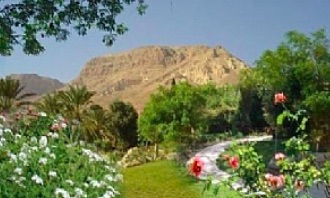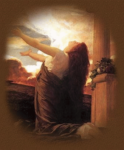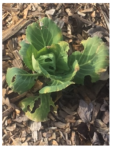13 My beloved is unto me a fragrant pouch of myrrh resting between my breasts.
14 My beloved is like a cluster of henna blossoms in the vineyards of En-Gedi.
Gathering information for Song 2:14 has been overwhelming. So many facts and facets about Henna and En-Gedi to chew on; and for a while, I didn’t know how the Spirit was making it alive to me. Partly though, it’s been a difficult couple weeks. I think I needed to linger more in verse 13, about myrrh. In case you missed those posts, they are here, here, here and here. (I know, that’s a lot of lingering!) :-)
Anyway, here’s my brief summary of myrrh. Knowing Christ” as a bundle of myrrh” is especially necessary for seasons of humbling and death-to-self. A “bundle” of it reminds us of the swaddled body of Christ in the grave, and “between the breasts” brings it all close. Very close. “I carry about in my body the death of the Lord Jesus,” 2 Corinthians 4:10.
But why Henna blossoms? Why now?
Well, what comes after death and burial? Yes. Resurrection! Henna speaks of hope, new life, and spiritual refreshment. It’s about time, right? ;-)
Coming out of a “desert” period, it’s an encouragement to be on a scent trail of Christ as a cluster of henna. He doesn’t leave us. Ever.
Speaking of scent trails… I hope you “catch the drift” in the following story that pieces together the mention of spikenard, myrrh, and henna. (PLUS a sneak peek into how it all transitions into doves eyes!)

The Scent Trail of Love
The Shulamite woman quietly enters a room, where King Solomon is seated at his “round table.” Busily talking to his men and looking at charts, he doesn’t see her standing behind him. But soon he lifts his nose to the air and closes his eyes…obviously catching a waft of her perfumed prescence! This delights the Shulamite, and she sings in his ear, (which only he hears…envision it like an opera) “While the king is around his table, my spikenard spreads its fragrance!” verse 12.
Solomon returns to looking at his papers, but there’s a boyish smile on his face. He knows his bride misses Him. The Shulamite, however, turns away and slips out the door. He is busy right now, she thinks to herself, so I’ll have to wait for a better time. Is she discouraged? A little bit. She’s trying to learning that his love is always with her, even when she can’t see him.
At this point the Shulamite decides to take a walk in the countryside, unaware she was wandering so far. She realizes it when the wind hitting her face felt dry and harsh, and her feet stumbled on rough and uneven terrain. The Dead Sea valley…a desert place…she knew it existed, but had never walked it alone. “It will try your soul,” people said, “but it won’t destroy you if you persevere.” Instinctively reaching down her gown, the Shulamite pulls out a small sachet hanging from her neck. Breathing the rich, earthy smell bound inside, she sings, “My beloved is like a pouch of myrrh that rests between my breasts,” verse 13. Comforted with a sense of her beloved’s presence, she journeys on. (a journey that felt like a few days, even years, that was really only a few hours.)
Suddenly, the Shulamite stops and shades her eyes. In the distance she could see the boundary of a lush, green oasis! It was En-Gedi, the place where David hid from Saul and was protected. Meaning “Fountain of the Lamb,” many a weary traveller found refreshment in its shade, waterfalls and vineyards. Since then Solomon planted vineyards there, and also a surrounding hedge of thorny bushes to keep out foxes. These bushes were called Henna, or Camphire, and the plant had many uses. Women especially loved the flower clusters. Gathered at the right time, they made the most amazing perfume.
What joy fills the Shulamite at the sight of En-Gedi! But even more so when she notices the henna was in bloom! She eagerly picks up her pace, no longer feeling her weary legs or parched lips. The closer she gets to the oasis, the stronger the fragrance of henna became. Breathless, she arrives to the hedges and buries her face in the cloud of blooms. The thought of the King then fills her senses, causing her to sing out loud, “My beloved is like a cluster of henna blossoms in the vineyards of En-Gedi!” verse 14. Smiling with this new revelation, the Shulamite removes a cluster of the flowers and slips it over her ear. Now she is adorned with her beloved on the outside, just as she is (with the myrrh) on the inside.
What’s that sound? The Shulamite startles at the sound of footsteps behind her. She turns quickly, and then sees him. Yes, him. Standing right behind her is the King! Solomon had followed her all through the desert, all the way to En-Gedi! She’s overcome with amazement and delight.
“Look at you!” the King says, displaying such tender adoring eyes. He reaches out for her hand. “How beautiful you are, my darling. You have the eyes of a dove!” verse 15.
…To be continued. :-)
![]()
Closing Thoughts:
Wherever we go, we cannot escape the fragrance of Jesus. In so many ways He is communicating to the world, “Peace!,” to both those who are near, and to those who are far off. (Isaiah 57:19) In the disappointments and quietness of the desert, He is there. In the answered prayers and encouraging revelations of the oasis, He is there. In every season of life – death, burial, and resurrection – He is there.
But knowing this, and manifesting it in our daily lives, are two different things, aren’t they?
The Shulamite woman gives us clues how to both know and manifest. Being in a passion of “first love,” little went unnoticed to her. When she couldn’t see or feel the King, she still found creative and playful ways to bring him close throughout the day.
This is why, at the end of her “scent trail,” (from spikenard to myrrh to henna) the King was positively overwhelmed by her singular focus, and declared, “You have dove’s eyes.”
Stay tuned for more on that. :-)
Journey of Tears

Ein-Gedi Botanical Gardens, Modern Day Israel
Nipping foxes,
Trashing hopeful vines,
Noise and confusion, the wind howls,
Trudging through loneliness, and —
Tears…
In a land,
No glimpse of God it seems,
Except there, in the distance,
The sight of blooming Henna, brings —
Tears…
Of delight,
Hope renewed with budding vines,
For Henna mean no more foxes,
Eating no more blossoms, again —
Tears…
Now waterfalls,
Eating from fruitful vines,
The Beloved is to me a cluster of Henna,
In an oasis of happy —
Tears!
-By Pamela, June 23, 2020





2 comments
I pray Pamela that you live this vision and also that you would expand it by reading even a deeper reality concerning it in both Watchman Nee and Witness Lee’s books called SONG OF SONGS. Your heart will burn even more with love for our Lord, Christ, and King; the Lord Jesus Christ.
Jnoske@bellsouth.net
Your brother in Christ
So beautiful and inspiring thank you for sharing